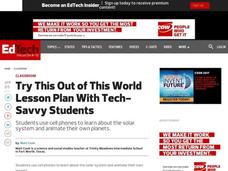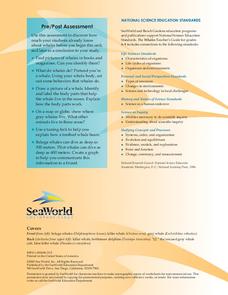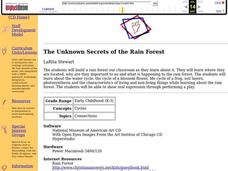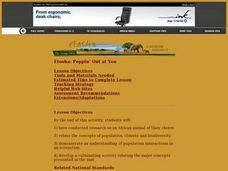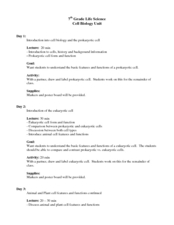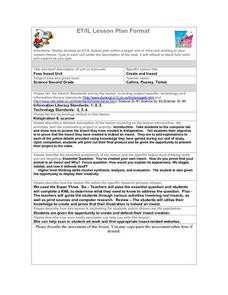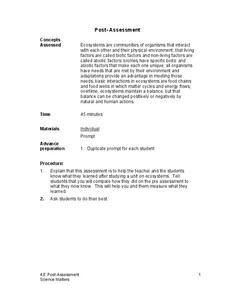Curated OER
The Unknown Secrets of the Rain Forest
Students explore the rain forest and where they are located. Students examine why the rain forests are important and what is happening to them. They investigate the water cycle and life cycle of a frog. Students build a rain forest in...
Curated OER
Creature Features
Young scholars examine why certain animals live in only specific places throughout the world. Using animals, they classify them based on their characteristics and identify their basic needs. They also observe and compare the life cycles...
Curated OER
Environment" The Mining Cycle
Students explore the world of mining and explain its importance in daily life. After describing how companies search for mineral deposits, they examine the environmental consequences of mining as well as the positive aspects. The...
Curated OER
Out of This World
Fifth graders animate their own planets. In this solar system lesson, 5th graders use smartphones and the software, GoKnow Sketchy, to create images for presentations on their created planets that appear to be animated when played at a...
Core Knowledge Foundation
A Time for All Seasons - Summer
The sun is shining and the birds are singing, what better time to teach young learners about the fun season of summer. In this week-long science series, children learn how the rotation and orbit of the earth influence the days and...
Core Knowledge Foundation
A Time for All Seasons - Winter
As the days get shorter and a chill enters the air, it's time to start teaching your little ones about the wondrous winter season. Through a series of teacher demonstrations, whole-class read alouds and discussions, and hands-on...
Sea World
Whales
A whale of a lesson is sure to intrigue your elementary oceanographers! Learn about the mammals of the sea with a series of activities about whales, dolphins, and porpoises. Kids complete worksheets about the anatomy of a whale, create a...
National Park Service
Reduce Our Carbon Footprint, Let’s Compost!
Roll up your sleeves and get a little dirty with this elementary and middle school compost lesson. All you need is a large plastic container, a couple old newspapers, some organic waste, and a few hundred worms and you're ready to start...
Curated OER
The Unknown Secrets of the Rain Forest
Students listen to the story "The Great Kapok" then discuss characteristics of the rain forest. They make several different types of rain forest animals from paper plates (ex. sloth, tigers, monkeys etc) and design costumes for a...
Curated OER
Gametogenesis and Fertilization
High schoolers explore how this module focuses on part of the cycle of alternation of generations: meiosis to produce haploid spores and fertilization to produce a diploid zygote which grows into the adult plant.
Curated OER
Island Animals
Students explore the concepts of endangered animals and conservation. In this animal conservation lesson, students complete activities to investigate the endangered animals of the US Virgin Islands. Students complete multiple worksheets...
Curated OER
Fiber of Life
Students examine the importance of plants to individuals and society through a multi-discipline set of activities. They observe and draw different leaf structures and then create a book about trees and photosynthesis. They explore ways...
Science Matters
Ecosystem Pre-Assessment
Test scholars' knowledge of ecosystems with a 20-question pre-assessment. Assessment challenges learners to answer multiple choice questions, read diagrams, and complete charts.
Curated OER
Woodland Animals and Their Habitat
Learners explore the natural environment through a video and nature sounds tape. They keep journal's of the unit's activities and vocabulary terms. They play a web of interdependence game and compose a list of forest animals and write...
Curated OER
Compost Columns
In this unit of lessons, middle schoolers examine the role of compost columns and recycling. They create a KWL chart about garbage in Chicago. They also examine life cycles and packaging of everyday products.
Curated OER
How do plant & animal cells make and use energy?
Students show the relationship between the need for plants to undergo photosynthesis in order to generate oxygen. They see the flaws associated with this thinking because of the lack of CO2 and H2O and lack of sufficient gravity in order...
Curated OER
Etosha: Poppin' Out at You
Tenth graders research an African animal of their choice and relate the concepts of population, climate and biodiversity to their animal. They examine how population interacts in an ecosystem.
Curated OER
Cell (Biology)
Students conduct a series of activities to explore the nature of cells. In this biology lesson, students observe plant and animal cells under the microscope and compare them. They differentiate osmosis and diffusion.
Curated OER
Life on a Farm
Students take a field trip to a farm or observe pictures of farms and animals in the classroom. They paint a mural of a farm setting with animals. They practice phonetic skills with farm stories and songs. They explain how milk becomes...
Curated OER
Insect Unit
Second graders use technology to investigate the concept of an insect. They use Kidspiration in order to create an insect. Then research is conducted to match the picture with the correct insect. Then students write a report about the...
Curated OER
Food Chain
Students explore the cycle of how each living thing gets food. In this food chain unit, students participate in four lesson plans that highlight animal vocabulary, habitats, and the role of humans in our ecosystem. Students demonstrate...
Curated OER
Charlotte's Web
Students examine the story, "Charlotte's Web" in the nine lessons of this unit. As the students progress through the book, they will explore the story plot, setting, character, and the value of friendship.
Curated OER
What's Hatching in Kindergarten?
Students identify oviparous animals. They brainstorm a list of animals that lay eggs, read "Chickens Aren't The Only Ones" by Ruth Heller and then add to the list. Students complete a booklet that shows an egg and an oviparous animal.
Science Matters
Post-Assessment
Twenty questions make up an assessment designed to test super scientists' knowledge of ecosystems. Scholars answer multiple-choice and short-answer questions about organisms, food chains, energy flow, and more.





